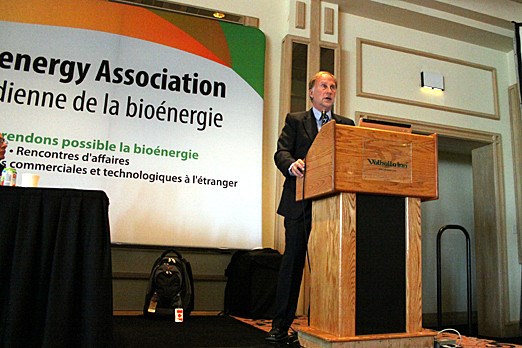Bioenergy supports the local economy by providing jobs, says the head of the Canadian Bio-Energy Association.
The Centre for Research and Innovation in the Bio-Economy and the Canadian Bio-Energy Association held a two-day conference at the Valhalla Inn on Tuesday. The workshop featured presentations on possible ideas on how to better utilize bioenergy in Canada.
Douglas Bradley, president and executive director of Canadian Bio-Energy Association, said bioenergy supports the local economy by providing multiple jobs.
"You buy a wind turbine, install it and maybe there’s one job for maintenance," Bradley said. "With bioenergy you have a whole slew of jobs in the community from biomass supplies, working in the plants and indirect jobs. There’s a lot going for bioenergy. I think the bioenergy opportunities are here and will be here to help individual communities all across the north."
He said the Ontario Power Authority had the right idea with the Feed In Tariff program but focused too much on power, which favours solar plants and wind farms when the emphasis should be on bioenergy and biomass.
"Bioenergy produces power and heat," he said. "If Ontario really wants to be fair about this they should give incentives to both heat and power. The Europeans learned long ago that they wanted to stop sending money to the Middle East.
“They wanted to keep it in the community and that’s exactly what bioenergy does. Wind doesn’t do that."
Lorne Morrow, CEO of Centre for Research and Innovation in the Bio-Economy, said he hoped the conference would give participants a chance to talk about new products that would help the forestry sector.
The forest biomass shouldn’t be used just on news print and lumber but expanded to other products including energy, chemicals and car parts, he said.
"I think (bioenergy) is the necessary step I don’t consider it the next best," Morrow said.
"I was one that ran a paper mill. I watched my paper mill close. If you have fixed costs, you have to spread those fixed costs. You spread those fixed costs by adding new products. So I think it is a necessary step. More value for the money."
Morrow hinted that CRIBE would have some big announcements in the next coming weeks.
Sign in or register
- Messages
- Post a Listing
- Your Listings
- Your Profile
- Your Subscriptions
- Your Likes
- Your Business
- Support Local News
- Payment History
Registered Users
Already have an account?
New Users
Create a free account.
